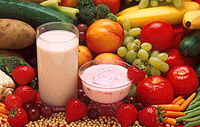- Low sodium diet
-
A low sodium diet is a diet that includes no more than 1,500 to 2,400 mgs of sodium per day.[1] (One teaspoon of salt has about 2,300 mg sodium.) People who follow a vigorous or moderate exercise schedule are usually advised to limit their sodium intake to 3,000 mg per day and those with moderate to severe heart failure are usually advised to limit their sodium intake to 2,000 mg per day.[citation needed]
The human requirement for sodium in the diet is about 69 mg per day,[2] which is typically less than one-tenth as much as many diets "seasoned to taste". For certain people with salt-sensitive blood pressure, this extra intake may cause a negative effect on health.
Contents
Indications and effects of low sodium diet
A Cochrane review published in 2008 concluded that a long term (more than 4 weeks) low sodium diet in Caucasians has a useful effect to reduce blood pressure, both in people with hypertension and in people with normal blood pressure.[3] Taken together, a low salt diet (median of approximately 4.5 g/day - approx 1800mg Sodium) in hypertensive people resulted in a decrease in systolic blood pressure by 5.06 mmHg, and in diastolic blood pressure by 2.70 mmHg. In people with normal blood pressure, the corresponding decrease in systolic blood pressure was 2.03 mmHg and diastolic blood pressure 0.99 mmHg.[3]
A previous Cochrane review indicated that the effect of low versus high sodium intake on blood pressure appears to be greater in Black and Asian patients than in Caucasians. However, the number of included studies in black and Asian patients in the review was insufficient for different recommendations.[4]
Food and drink contents
High sodium content
Sodium occurs naturally in most foods. The most common form of sodium is sodium chloride, which is table salt. Milk, beets, and celery also naturally contain sodium, as does drinking water, although the amount varies depending on the source. Sodium is also added to various food products. Some of these added forms are monosodium glutamate, sodium nitrite, sodium saccharin, baking soda (sodium bicarbonate), and sodium benzoate. These are ingredients in condiments and seasonings such as Worcestershire sauce, soy sauce, onion salt, garlic salt, and bouillon cubes. Processed meats, such as bacon, sausage, and ham, and canned soups and vegetables are all examples of foods that contain added sodium. Fast foods are generally very high in sodium.[5] Also, processed foods such as potato chips, frozen dinners and cured meats have high sodium content.
It has been noted that such large amounts of salts are given out by regenerative water softeners that over 60 cities in Southern California have banned these units because of elevated salt levels in ground water reclamation projects caused by water softeners and other sources. Water labeled as "drinking water" in supermarkets may have sodium since it is usually only filtered with a carbon filter and will contain any and all sodium present in the source water.[6]
Low sodium content
Unprocessed, fresh foods, such as fresh fruits, vegetables, lean meats, poultry, fish and unprocessed grains are low sodium. The availability of low sodium foods is increasing; Due to the difficulty of finding low sodium versions of processed foods that are naturally high in, or contain medium levels of, sodium (such as cereals, soups, and canned seafood), food markets and distributors have recently started opening online businesses that focus on marketing low sodium products. Just like low carb or low calorie products, low sodium products began to take their own place in food marketers’ shelves. Many low sodium products have crossed over from the hospitality industry and are now available online, such as low sodium soup bases.
Other foods that are low in sodium include:
- Seasonings: Black, cayenne, or lemon pepper, mustard, some chili or hot sauces
- Herbs: Dried or fresh garlic, garlic/onion powder (no salt), dill, parsley, rosemary, basil, cinnamon, cloves, paprika, oregano, ginger, vinegar, cumin, nutmeg
- Fresh fruits and vegetables (celery, carrots, beets, spinach)
- Dried beans, peas, rice, lentils
- Macaroni, pasta, noodles, rice, barley (cooked in unsalted water)
- Honey, sugar
- Unsalted butter
- Unsalted dry curd cottage cheese
- Fresh beef, pork, lamb, fish, shrimp, egg
- Skim milk, yogurt
- Hot cereals
- Club soda, coffee, seltzer water, soy milk, tea[7]
See also
- Health Canada Sodium Working Group
- Iron poisoning – excess iron
References
- ^ Heart Failure Society of America, How to follow a low sodium diet
- ^ Implementing recommendations for dietary salt reduction: Where are we? DIANE Publishing. ISBN 1428929096.
- ^ a b He FJ, MacGregor GA. Effect of longer-term modest salt reduction on blood pressure. Cochrane Database of Systematic Reviews 2004, Issue 1. Art. No.: CD004937. DOI: 10.1002/14651858.CD004937.
- ^ Jürgens G, Graudal NA. Effects of low sodium diet versus high sodium diet on blood pressure, renin, aldosterone, catecholamines, cholesterols, and triglyceride. Cochrane Database of Systematic Reviews 2004, Issue 1. Art. No.: CD004022. DOI: 10.1002/14651858.CD004022.pub2.
- ^ NIH Medline Plus Medical Encyclopedia
- ^ Sodium, Your Health, and Your Drinking Water by Gene Shaparenko, Aqua Technology Water Stores
- ^ Sodium: Are you getting too much? Mayo Clinic
External links
Diets Basic types 
Religious diets Buddhist · Hindu · Islamic · Ital (Rastafarian) · Kashrut (Jewish)
Specific restrictions Calorie restrictions · Gluten-free · Gluten-free and casein-free · Low-carbohydrate · Low-fat · Low-sodium · Very-low-calorie
Other diets Categories:- Diets
Wikimedia Foundation. 2010.
